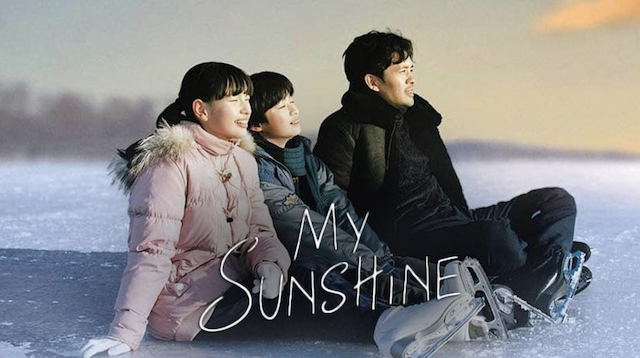
©Courtesy of Tokyo Theaters
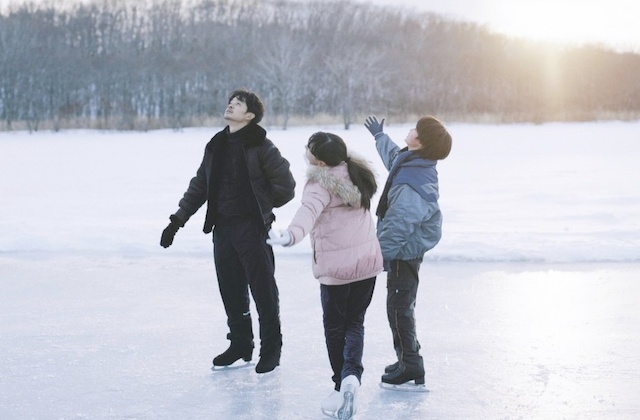
©Courtesy of Tokyo Theaters
Exclusive Interview with Hiroshi Okuyama
Q : The film “Jesus,” which you directed while still in college, was highly acclaimed and won the Best New Director Award at the San Sebastian International Film Festival, making you the youngest director ever to win the award, during that time, you also worked on music videos for a highly regarded musician Kenshi Yonezu and very famous group Nogizaka46. How did you come to make this film after this well received first film?
Hiroshi Okuyama : The biggest thing is, as you just said, after the San Sebastian Film Festival, I had received several offers to make a films, but I wanted to make an original film without any books that based on.
When I started thinking about the project, “Jesus” was a film that reflected my experience of going to a mission school, so I started digging around in my memory to see if there were any other experiences that could be used as a subject matter, So, when I dug up my memories to see if there was anything else that I had experienced, one of the top things that came to mind was learning figure skating.
I had been learning figure skating for seven years, and I was wondering if I could incorporate that into some kind of film, and then I got some music video work, or a commercial job, and I stopped, and I kept doing that, and eventually two or three years went by, and then we ended up at the Covid. And then the Covid went away.
But, even if I had tried to make a movie about figure skating, my skating life did not have much drama like a sports drama, because I had just been enjoying figure skating in a carefree and lazy way. It was just something I learned to do, so I thought it would be a very offbeat film, and I was struggling with it.
Right around that time, I came across Humbert Humbert’s song “My Sunshine,” and I thought that if I were the main character in this song, it might start to make a film, around the same time, when the Hermes advertisement started, I wanted Mr. Ikematsu to be in it, and I asked him to be in it, and I wondered what kind of role I could get him to play. As I was thinking about it, I came up with the role of Arakawa, and I felt that the encounter between the two made me see it all at once.
Q : So you started writing the script with Mr. Ikematsu in mind to some extent?
Hiroshi Okuyama : Yes, once in the plotting stage, Ikematsu’s role was originally a completely different role, and all three of lead characters were almost the same generation.
There was another boy of the same generation as Takuya and Sakura. Based on Mr. Ikematsu’s idea of what he wanted to show in the role, we raised the age of his character and changed the role to Sakura’s coach instead of her friend.
So I approached Mr. Ikematsu at the plot stage, and he said, “I’ve already got it,” and that was the order in which I developed the script.
Q : When Ikematsu played the role of the skating coach, it seemed that he was already getting the hang of teaching style as coach, as if you have been teaching for quite a long time, what kind of preparation did you have him do that or did you give him some guidance on the spot, since you yourself have figure skating experience in the past?
Hiroshi Okuyama: The biggest thing, of course, was that Mr. Ikematsu practiced figure skating for a long time. At that stage, it was more of a request to discuss the next film that I was thinking of making. I was hoping him to get a sense of the expectation of the film, but he said he would do it.
I wrote the script based on Mr. Ikematsu in my mind, but while I was writing the script, Mr. Ikematsu told me that he wanted to try skating once and started practicing more than half a year ago.
At that time, (Mr. Ikematsu) was still busy with other projects, so he would practice with us occasionally, but one day, he came to our Ice skating link several times a week to practice.
He practiced hard, and but Ikematsu-san was also very busy, and we asked some top figure skating coaches to help him, and they were also busy as well with their schedule as coach, so inevitably, Ikematsu-san learns from many people.
I feel that Mr. Ikematsu was able to get a variety of perspectives and at the same time, he was exposed to the image of various coaches in real life and learned how coaches talk like this, which he used in his performance.
I think that the fact that you practiced skating and got good at it, and at the same time, you were exposed to the image of a coach during the training process, helped him a lot in his performance. I don’t think he needed much of my help.
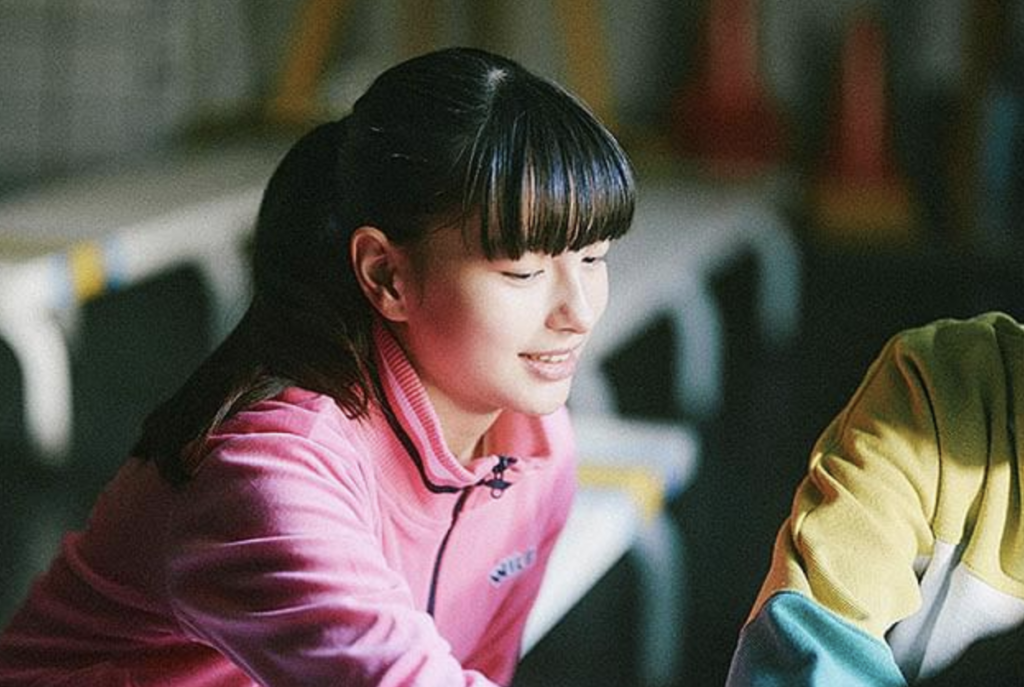
©Courtesy of Tokyo Theaters
Q : Mr. Ikematsu himself had experience as a former child actor in films such as “The Last Samurai”, so when it came to casting, did his experience as a former child actor make him an ideal candidate to work with the actual child actors? Also, did Mr. Ikematsu help create an environment that made it easier for you to teach and work with the children on set?
Hiroshi Okuyama: I had never seen Mr. Ikematsu with a child before, and of course I knew that he had played children before, but I had never seen a combination of Mr. Ikematsu and a child, so I thought it would be fresh and good.
My reason for asking him to do it was because I believed it would be fresh and good, not because I thought he would do it well. And he was well-suited for the role. Because he was a child actor himself, he understands how child actors feel, which is why his approach to them is different from that of ordinary actors. He aims to nurture and teach them more than his co-stars. Mr. Ikematsu’s direction and acting with two children was a great help to me.
Q : The two child actors, Keitatsu Koshiyama and Kiara Nakanishi, were cast because of their skating experience, what did you find attractive in the audition process that led you to cast them? In my opinion, it’s not enough to just be able to skate, and particularly in Koshiyama’s case, he must undergo a process of not being very good at figure skating to become very good at it.
Hiroshi Okuyama: At first, I was thinking that it would be good if he(Takuya’s role) could learn figure skating, even if he couldn’t figure skate initially. But it was difficult to do so, and It wouldn’t be convincing if Sakura wasn’t better than Takuya. But when I started auditioning for the role of Takuya, I found a child actor who could skate, act reasonably well, and had an atmosphere similar to that of Takuya. Then I had to find a girl who could skate better than him, but I couldn’t find her at all.
Girls who are serious about figure skating are just like boys, but they are mostly dedicated to figure skating rather than other activities. I thought it would be difficult to find girls who are serious about figure skating among those who belong to entertainment agencies, so I asked the four of them to come to the skating rink and skate without thinking about figure skating. I asked them to come to the skating rink and skate that way.
The teacher and I made a decision to pick the girl with the most potential to be a good actress, and asked her to portray Sakura. I requested that she play Sakura and that she practice skating for half a year before the shooting. I realized after about 2 minutes of skating that it was not going to work. The majority of them were in junior high school, and upon their first ice experience, they were so terrified that they couldn’t even stand up.
It was impossible for her to make the jump in six months, so we changed our strategy quite a bit and put up signs at skating rinks around Tokyo saying that we were looking for heroines, and we taught Nakanishi, who saw the signs and applied, how to perform from the beginning. She had never acted before, but her acting atmosphere and skating charm were very close to the image of Sakura, so we cast her.
Q : Most skaters started in elementary school, and many younger skaters started in kindergarten. It is totally different if you start from junior high school, isn’t it?
Hiroshi Okuyama: It is said that by the 6th grade of elementary school, you can already tell if you can make it to the Olympics or not, so it is a little too late to start in junior high school.
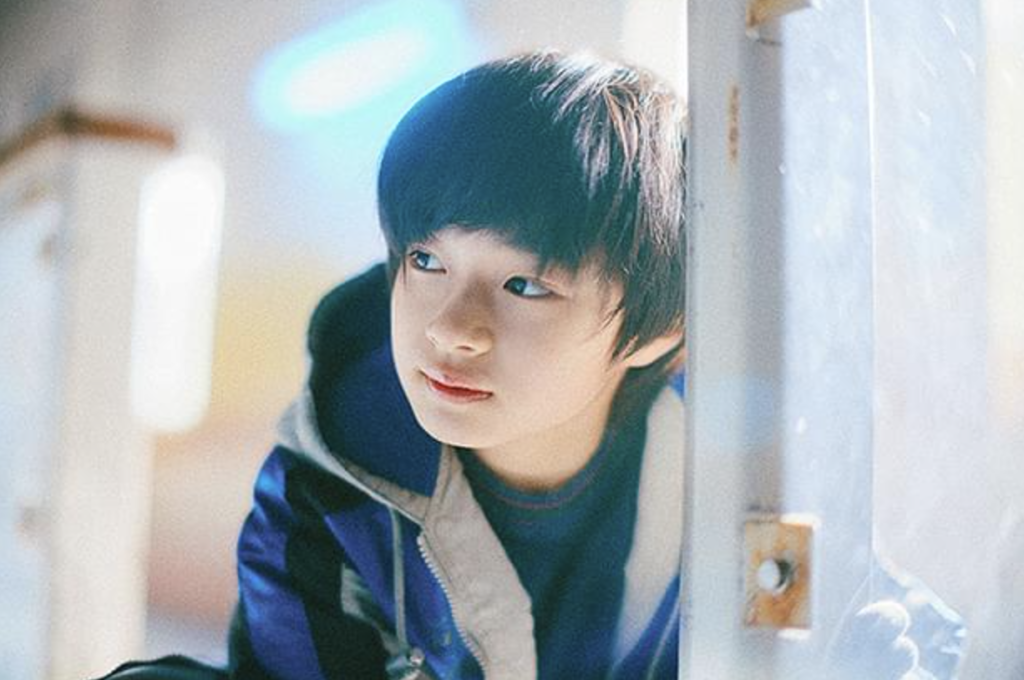
©Courtesy of Tokyo Theaters
Q : Swimming and skating, perhaps. I found the fact that you didn’t have many lines in this film to be striking, as I thought it conveyed a lot of information through the look in their eyes and expressions. I had a feeling of tenderness that resembles that of a child, as if I was watching François Truffaut’s ‘The 400 Blows’. Did you consider minimizing dialogue and using eye contact and facial expressions to convey the message of the film?
Hiroshi Okuyama : Yes, there was. My intention was to convey emotions by using facial expressions and eye contact instead of dialogue. Isn’t it true that emotions can be conveyed through dialogue? I think that facial expressions are a more effective way to convey true emotions than words, which is why I was mindful when shooting the film.
The reason for this is that I wanted to make a film that would reach people overseas. When I shot “Jesus” for the first time, I played the role of Jesus, who does not speak, so there were no words, but it reached foreigners in the same way as Japanese people, and they laughed.
When I saw that, I realized that there are moments when film can be a common language more than words or languages. I believed that this was the motivation behind my desire to create films that aimed at future and international productions, and that experience was a significant part of it.
My intention was to shoot with the intention of telling the story through facial expressions and eye contact as opposed to using narration, tickers, or even explanatory lines.
Q : Besides being a scriptwriter/director, you are also a cinematographer, In the U.S., director Steven Soderbergh was also a cinematographer, and in Australia, Nicholas Roeg is a cinematographer-turned-director, what subjects do you find particularly interesting as a cinematographer?
Hiroshi Okuyama: I feel that my career is similar to that of Nicholas Roeg, although I have been a cinematographer for much less time than him, in short, I have a strong sense that I started out as a cameraman, and in fact, I was a cameraman when I was a student. While I was studying, I had the opportunity to be a cameraman, I was considering becoming a cameraman. At one point, I felt that my own desires were more important than meeting the director’s expectations. After graduating from university, we decided to create a graduation project, which was the first time I directed.
I feel that my desire to make this kind of film is stronger than that of most directors, and that’s why I want to make that story more than I want to make this kind of story, I want to shoot this kind of picture, or this kind of scenery, or that kind of person, and then I think, “What kind of story do I have to come up with to get that picture? I think, “What kind of story do I have to come up with in order to get that picture? Of course, that’s why I am very particular about the shots I take, and I hope to take my time and carefully capture each one, as if it were a picture-story show.
Q : I was amazed by the way the sun was shining on the skating rink, particularly the gentle light that shone through the trees, like a cinematographer, Néstor Almendros in ‘Days of Heaven’, and I’m not sure if you saw it, and the way the light is soft like that, it creates an environment with a soft atmosphere and makes you feel as if you are looking down from the heaven.
Hiroshi Okuyama: Yes, I was very particular about the lighting. The lighting director was someone I used to work with when I was doing commercials, but this was my first time working with him on a film, In Japanese films, the tendency is to light the scene in a very flat way, or the light tends to be turned around as a whole, because people are always thinking, “Let’s light it up, let’s show it off, let’s light it up well.
In Japanese films, the tendency is to light the scene in a very flat way, or the light tends to be turned around as a whole, because people are always thinking, “Let’s light it up, let’s show it off, let’s light it up well. However, we talked about how we wanted to create lighting that has shadows and shadows that make the light stand out.
We talked about making the light a little allegorical or fantastical, and to reproduce this, we asked them to prepare lighting for as many windows as possible, We had the mats on the other side of the room covered with black blackout curtains, and we created the light in a very artificial way, fine-tuning it for each scene and thinking about what color would be the main light for this scene.
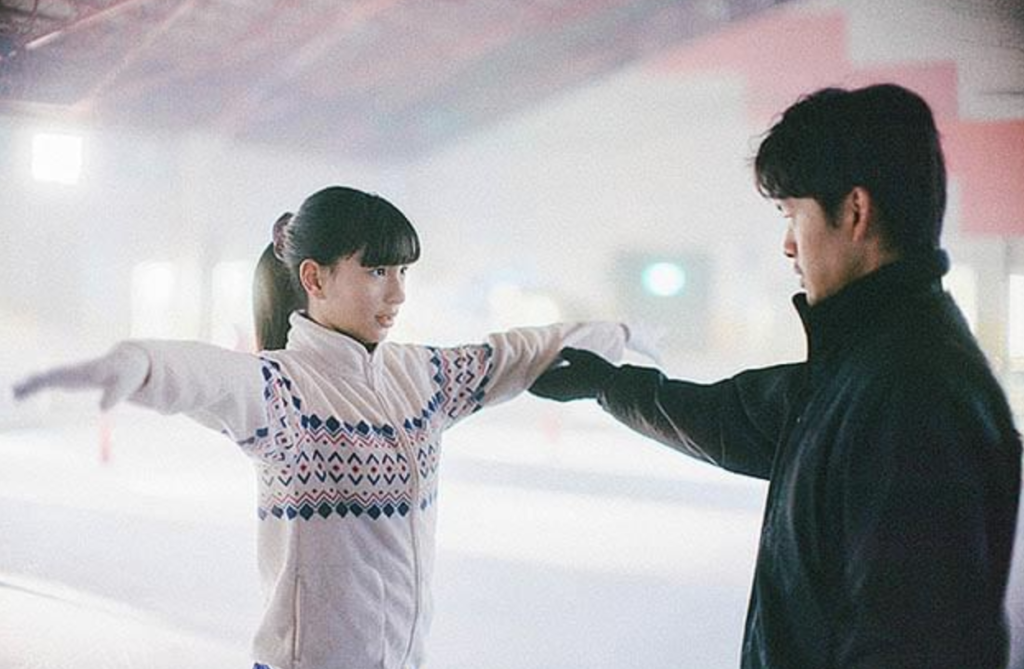
©Courtesy of Tokyo Theaters
Q : I know it may be a little difficult to answer this question, but after working on your two feature films, what do you think needs to change in the Japanese film industry, and from the viewpoint of a young filmmaker, what do you want to see change in the film industry?
Hiroshi Okuyama is employed by an advertising company, and his main task is to create advertisements. Even though I may be a film director, I always felt like an employee of the company until I created this film. Upon making this film and attending film festivals as a film director, I was asked questions by people from abroad, particularly regarding the Japanese film industry and young filmmakers.
When I am asked questions about the Japanese film industry or as a representative of young filmmakers, my awareness of the Japanese film industry is awakened, and I realize that I can no longer be a mere outsider! I am starting to think about what I can do to make a difference.
In addition, I find it difficult to make an original film due to the high hurdles and lack of resources and funding. I am wondering what I can do to help. If there is anything I can do now, it would be to encourage young people to enter the industry, I think the only thing I can do now is to show young people how to continue making films in a way that they will want to enter or aspire to.
My intention is to demonstrate to the next generation or even my own generation that there is a way to produce films this way, or, in other words, raise funds for them through my activities. In order to achieve this, we have decided to make this an international co-production, and it will be a co-production with France.
We didn’t shoot in France at all, but by editing the film in France, we received a grant to help us with editing and cosplay expenses. I would like to convey to future generations and to my own generation that there is such a way. Of course, this is not limited to that, and I hope that by continuing to study myself, I can gradually lower the hurdle I mentioned at the beginning, which is the difficulty of making an original film.
Q : I understand that very well. When I interviewed Mr. Kiyoshi Kurosawa at the Toronto Film Festival yesterday, he told me that most of his films are distributed overseas and have sold a certain amount. According to him, he only needs a certain amount of money to survive or recognition in order to make his next film. It appears that he wasn’t too fussy about money. Of course, this is true for a great director like Kurosawa, but he himself teaches at a school, so I think he is involved in nurturing young filmmakers to some extent, but I would like to see a system that allows those who are a little higher up to give a little more back to filmmakers. I myself would like to see a system that allows those at the top to give a little more back to the filmmakers. You worked with Director Kore-eda on “The Makanai: Cooking for the Maiko House” for Netflix, and Mr. Kore-eda is very active in nurturing young filmmakers. I personally hope that the higher-ups will create an environment where money can go to the film makers and be returned to them.
Hirosh Okuyama: Yes, I think so, but I also think that Kore-eda-san and others are a generation far above me, and of course I am a distant generation, so I wonder how I can avoid relying on them. Kore-eda and others are doing their best, but I think it would be good to help them in whatever way I can, and at the same time, I also think it would be good to go beyond the realm of the past generation more easily.
I also think it would be good if we could establish a style of filmmaking in which we can earn money while gaining various things in the process of making various things, such as commercials, TV dramas, and distribution of videos, which are all part of the same category. I think it would be good if we could establish a style of making things that allows people to earn money while acquiring various things in the process of making things in a light-hearted way.
Q : Your film was selected for Un Certain Regard at the Cannes Film Festival, and was also shown at the Toronto International Film Festival and the Pusan International Film Festival. What did you learn from each film festival, and what do you want to reflect in your films in the future, such as working together with overseas producers or obtaining production funds?
Hiroshi Okuyama: Reactions really differ from country to country, or more precisely, from film festival to film festival in the same country, but the reactions are really different from festival to festival, and the people you can meet are also different.
When you go to Cannes, you can meet a lot of people in the film industry, not only from Japan, and Cannes is a very effective place to communicate closely with world sales companies that market your film. I asked a French company called Charade to come to Cannes, and they brought almost all of their staff to Cannes, rented an office for the period, and we talked with them.
It was a great learning experience for me personally to visit these festivals and discuss future plans, and to hear about what kind of film festivals they are planning to include in their programs.I also learned a lot about which film festivals should be prioritized and in what order, and I was told that basically, when deciding on a film festival, it is better to decide on a film festival in conjunction with the distributor in that country, and that it is important to participate in a film festival while having the distributor handle various aspects of the film festival. I was also told that it is important to participate in the festival while having the distribution company handle various matters, After that, for example, we were able to enter the San Sebastian Film Festival after finding a Spanish distributor, It was also the same with Taiwan.
So when I go to a film festival in Taiwan, I am greeted by people from Live House, a company that distributes films in Taiwan, and I can talk with them about how to develop my film in Taiwan, at the same time, since we are in the country, we can also be interviewed by the media in the country. The media in that country would book me for interviews, so I was able to learn a lot from them as well.
When you go to a country and talk to the audiences there, you discover new things about what they are thinking and how they look at films from that perspective. I think there are so many things you can learn in each country through going there to get reactions from the audience, conducting interviews, eating dinner with the distributors in that country, and having many discussions.
The last time I went to the Toronto International Film Festival, a company called Film Movement was distributing the films, so we didn’t have much time for discussion, and they were very busy with a lot of films, so it was difficult to communicate with them. It was not so easy to communicate with them, but I think just meeting them once can make a big difference in the relationship afterwards, so it was a good opportunity, the Toronto International Film Festival has a Q&A session, which is rare among large film festivals. It was also a good experience for me to have discussions with film fans. Also, the people at the festival are very kind.
Giovanna and June were the programmers for the East Asia section, and they said, “If you don’t want to see the second screening, let’s go out to eat together, they would take me out to eat with them, and sometimes they would take me out to eat with them, and when we talked there, we talked about really trivial things, but it was a lot of fun. It was a really good experience, and I learned a lot from it. The film is still to be released in Japan, but most of the countries overseas have yet to release it, so I hope I can do my best as I continue to participate in film festivals.
If you like the interview, share your thoughts below!
Check out more of Nobuhiro’s articles.
Here’s the trailer of the fiilm.

